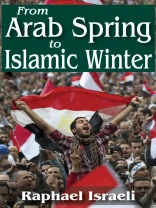The world is watching with uncertainity as the ‘Arab Spring’ unfolds. Optimistically named by international media sources, the term ‘Arab Spring’ associates the unrest with ideas of renewal, revival, and democratic thought and deed. Many hoped the overthrow of authoritarian leaders signaled a promising new beginning for the Arab world. Raphael Israeli argues that instead of paving a path toward liberal democracy, the Arab Spring in fact launched a power struggle.
Judging from the experiences of countries where the dust is settling—including Tunisia, Egypt, Yemen, and perhaps also Syria and Libya—it appears that Islamic governments will fill the vacuum in leadership. The hopes that swept the Islamic world with the Arab Spring have given way to a winter of lost hopes and aspirations, as it becomes increasingly clear that democratic outcomes are not on the horizon. What is worse is that the West seems to have abandoned its hopes for democracy and freedom in the region, instead making peace with the idea that Islamic governments must be accepted as the lesser of evil options.
Presenting a clear-eyed picture of the situation, Israeli examines thematic problems that cut across all the Muslim states experiencing unrest. He groups the countries into various blocs according to their shared characteristics, then discusses these groups one by one. For each country, he considers whether the liberal-democratic option is viable and examines what kind of regime could be considered legitimate and stable. This volume offers valuable insights for political scientists, Middle Eastern specialists, and the general informed public eager to comprehend the import of these momentous events.
Про автора
Raphael Israeli teaches Islamic, Chinese, and Middle Eastern History at Hebrew University. Israeli is the author of forty-six books and one hundred scholarly articles in the fields of Islamic studies, the Modern Middle East, and the opening of China by the French.












